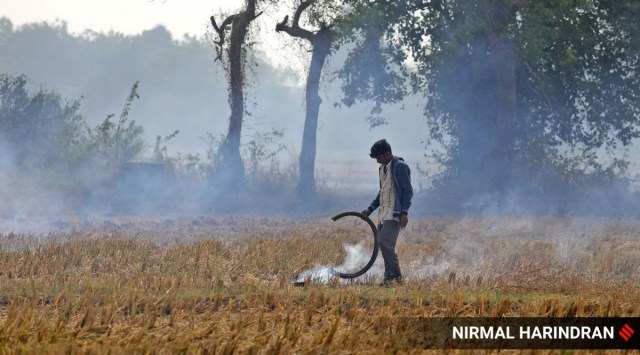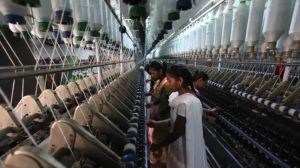Legal sanctity to MSP can push diversification in Punjab
Experts say if the Centre accepts this demand, then it will come as a boon for state like Punjab where a large number of farmers will leave paddy and the much needed diversification will take place automatically.
 A farmer burns paddy stubble (File)
A farmer burns paddy stubble (File)Gurmail Singh, a farmer from Haripur village in Jalandhar, is ready to grow pulses and maize instead of paddy (non-Basmati) on his 150-acre farmland, including over 100 acres on lease, if the Centre grants legal sanctity to the minimum support price (MSP) — a key demand of the farmers protesting at the Delhi borders for past over a year.
“Why should I turn my fields into a desert? I am a farmer and will do farming all my life but if my fields turn into desert then I will be rendered jobless. Every alternate year, I am pushing my tube well boring deeper even as stubble burning is damaging the soil,” said Gurmail, adding that growing paddy is a compulsion because of its assured procurement by the government.
“This season I am growing mustard crop for the first time because it has a huge market. I am looking for buyers,” he added.
Raghubir Singh of Mukerian, a small farmer, said, “I want to shun paddy and also decrease the area under wheat but there is no assured government procurement for other crops”.
Like Gurmail and Raghubir, thousands of other farmers in Punjab are ready to shift from paddy-wheat cycle if they get the guarantee of government procurement for other crops.
Experts say if the Centre accepts this demand, then it will come as a boon for state like Punjab where a large number of farmers will leave paddy and the much needed diversification will take place automatically.
As the Parliament approved a bill repealing the three contentious farm laws, it is the legal guarantee for MSP that has become the bone of contention between farmers and the Government. The Centre, which declares MSP of 23 crops every year including seven cereals, seven oilseeds, five pulses, and four other commercial crops, does not procure all and is not ready to take the onus on the pretext that it will put a burden of lakhs of crores on the exchequer.
In Punjab, state Congress chief Navjot Singh Sidhu had earlier asked his party’s government to give MSP to the farmers on crops like pulses and oilseed to begin with and then to expand it to other crops. In August, Shiromani Akali Dal president Sukhbir Badal said, if voted to power, they will introduce MSP for fruits and vegetables and pay the differential in case of reduction in prices to farmers.
“Around 35 to 36 million tonnes of wheat and paddy (non-Basmati) crop worth over Rs 56,000 are procured annually from Punjab by the Centre. The Centre is not happy with this bulk purchase and is looking for a way out. By legalising the MSP for all crops, the area under these paddy will be reduced and consequently procurement amount will also come down,” said Prof Sukhpal Singh, Principal Economist, (Marketing) Punjab Agriculture University (PAU). With this, government can focus on setting up processing units and cold chains that are the need of hour, he said, adding “MSP alone cannot bring prosperity as we need to go ahead with the processing market”.
State Agriculture Minister Randeep Singh Nabha said if MSP as a bench mark is ensured for all crops, the state government can push farmers out of the wheat-paddy cycle and focus can be shifted to growing maize, pulses and other crops too. “Each state must be earmarked with a quantum of various grains, for which MSP is announced. It must produce those crops and the same shall be procured by the central agencies at MSP. The time is to reinvigorate the country’s agricultural policy to make it more sustainable and to look after the farmer’s overall prosperity”.
Another expert from PAU, however, said, “The state governments cannot bear the burden of MSP completely but ‘yes’ they can at least take a step for a few crops, which has a good market in the state as well as outside”.
“Like other states that have started compensating farmers for crops that they sell below the MSP rates under their own state-level policies, the Punjab government should also take the step for a few crops,” said Prof Sukhpal Singh.
States including Madhya Pradesh, Haryana, Kerala have launched Bhavantar Bhugtan Yojna (price difference payment scheme), floor prices, and Bhavantar Bharpayi Yojna, respectively, under which the they pay the difference to the farmers when they sell their crop below MSP in the market. While the MP government has covered some cereals, pulses, oilseed and horticulture crops under its scheme, Haryana and Kerala have covered only horticulture crops and mustard oilseed. Haryana recently added millet to its scheme.
Sometimes even the presence of the government in the market stabilizes the prices in the open market and in such cases the government is not required to procure anything, said Prof Singh.
Punjab has a huge market for oilseeds and pulses as the state is meeting its 90 per cent edible oil demand and 85 per cent of pulses demand from imports.
“Huge area can be brought under oilseeds, which can be procured by the state agencies on MSP and after processing, can be sold under their brand names,” said Virender Sardana, principal agronomist and in-charge, oilseeds section, department of plant breeding and genetics, PAU.
State agencies like Punjab Agro and Markfed can play a big role as markfed products are very popular under Sohna brand.







